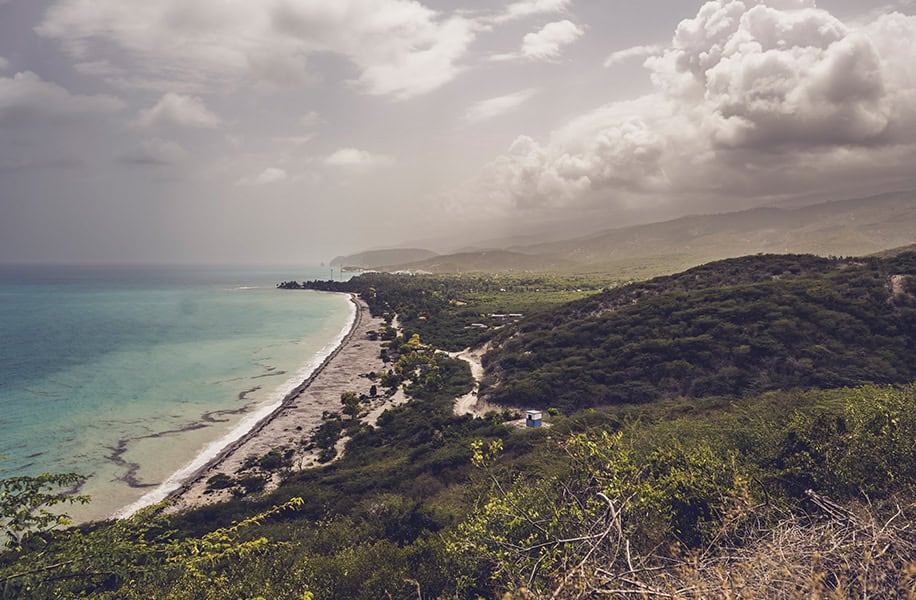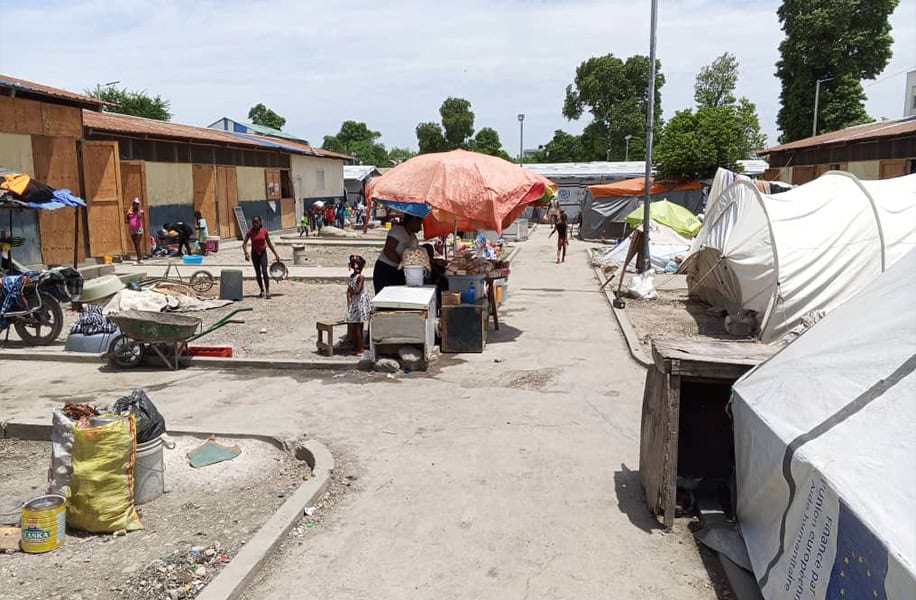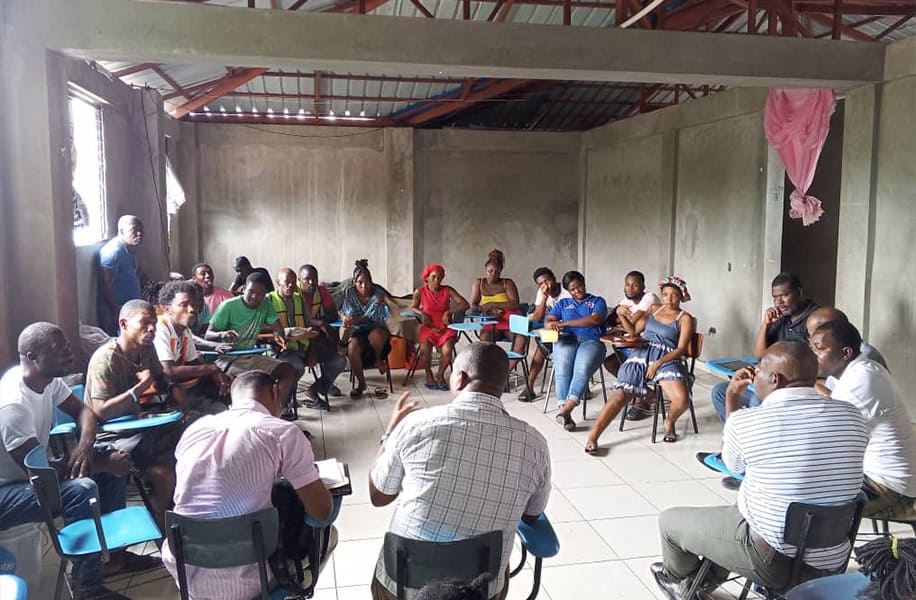What comes to mind when you hear the word Haiti? If you’ve watched the news recently, it’s likely words like violence, armed gangs, corruption and poverty.
And while it’s true, the violence in Haiti today has created what some call the worst humanitarian crisis in the Western Hemisphere, what if another story was true too? One of deep faith, resilience and resolve. Of a people whose lives, hope and history were more than the single story often told on the news?
At World Relief, we believe it’s important to celebrate the spirit of the people we serve even as we walk alongside them amid the crises they face.
Recently, I sat down with three leaders in Haiti — Darneley Saint-Vilus, Project Manager at World Relief Haiti; Enel Angervil, a local pastor and Executive Director of FOKA; and Jean-Claude Cerin, Executive Director of FCL — and asked for an update on what’s happening in Haiti today. World Relief is partnering with FCL and FOKA to support Haitians experiencing displacement.
Nearly 1.3 million people are internally displaced in Haiti and more than half the total Haitian population faces hunger and food insecurity. Unsanitary conditions are putting children at greater risk for sickness and disease, and armed groups have put women at greater risk of experiencing sexual-gender-based violence (SGBV).
Their response to my question was overwhelmingly clear — the situation is dire, the crisis is multi-faceted, people are in desperate need of help. And yet, violence does not define Haiti. Political corruption and armed groups are not the voice of the Haitian people.
“This is not our identity,” Darneley said. “Gangs are not the voice the international community should be hearing. In reality, Haitian people are hospitable … We are proud of our Haitian culture. What we are experiencing today is not our identity. It is not our culture at any time.”
You can support those experiencing crisis and displacement by giving today.
A Culture of Deep Faith and Resilience
Indeed, Haiti is a country steeped in a culture and a history that anyone would be proud of.
In 1804, Haiti became the first Black republic in history after a successful, slave-led revolution. The revolution took place from 1791-1804 and was led by Toussaint Louverture and Jean-Jacques Dessalines. Toussaint was a former slave, and though he died in 1803, Dessalines continued leading the fight and eventually declared Haiti a sovereign nation.
According to the Library of Congress, Haiti’s fight for freedom, “inspired uprisings and established Black-governed cities and towns in Brazil, Cuba, Jamaica, Mexico and the U.S. among others.”
“I know that the Haitian people are a peaceful population,” Jean-Claude said. “It is a resilient population, and it is a population that is very faithful … It is a proud nation that has fought for its freedom and has helped other countries around get their own freedom.”
Unfortunately, the war for independence also destroyed many Haitian plantations, leaving the economy in a fragile state. As a result, Haitian leaders were forced to purchase recognition of Haiti as a legitimate sovereign nation. In exchange for access to trade markets, they took on massive debt, further crippling the nation’s economy and leaving it prone to political hardship throughout the mid-20th century. This storied history left the country with a weak economy and feeble infrastructure that made Haiti vulnerable in the wake of natural disasters.
Darneley Recalls Growing Up in Haiti
Despite these hardships, the spirit of pride and resilience that drove Haiti toward independence more than 200 years ago remains today.
Darneley recalls growing up in Port-au-Prince. As a girl, she remembers her teenage years, in particular, were a good time to be in Haiti, with seaside days and recreational activities for young people during the summers, and retreat camps with local church youth associations that enabled her to discover other parts of the country as well.
“The situation in Haiti wasn’t always what it is today,” Darnley said. “Coming back from university, I remember that you could go for a walk on the Place du Champ de Mars (the biggest public park in Port-au-Prince) until 8 p.m., and there were still cinemas you could go to. These were adventures that left their mark on me and make me nostalgic for the country, even though I’m still in it.”
Today, Darneley holds a bachelor’s degree in Business Administration and a master’s in Development Sciences. She’s worked for local and international organizations committed to serving vulnerable people in Haiti.
“Over the past years, I have developed a passion for working in local development involving young people and women,” she said. “The closer you get to vulnerable communities, the more you understand the level of inequality between social classes and the obstacles to integrating young people into the country’s development. I find that helping or advocating for these people to have access to a minimum of services gives meaning to my work and that I’m contributing to something big.”

Violence in Haiti Today Has Led to Humanitarian Crisis
While Haiti has long endured a struggle for national stability, these challenges reached an unprecedented climax in 2024. In February of that year, a national election was postponed, exacerbating tensions and unrest that began in 2021 when President Jouvenal Moise was assassinated, followed by a 7.2-magnitude earthquake in August of that same year.
Since then, the price of goods and fuel has continued to rise, political demonstrations have become frequent and gang-related violence has engulfed the city of Port-au-Prince.
“Haiti is going through a multi-faceted crisis and it is very difficult to point out what is the priority,” Pastor Enel said. “There are restrictions within the country. You cannot leave Port-au-Prince to escape to the countryside.”
“Right now…there is a mixed sense of hope and still some of despair,” Jean-Claude added. “The violence has not stopped yet in Port-au-Prince and its surroundings. At the same time, with a new government installed, with the Multinational Security Support force starting to come into the country, there is hope.”
Still, Jean-Claude quickly reminds me that the gangs, which are so often the primary story shared in international media outlets, are not representative of the general Haitian population.
“The first thing people need to know is that the Haitian population is not at war…It is not factions of Haitian people fighting against other Haitian populations. Those are armed groups, armed by business people and politicians that are now doing violence on the population. The population itself is not armed and is not violent.”
Read 3 Things You Need to Know About the Crisis in Haiti
Local Investment Is Key to a New Tomorrow
Jean-Claude has worked in the non-profit humanitarian sector in Haiti for more than 20 years. He previously worked for Tearfund where he opened Tearfund’s office in Haiti and helped establish the RIHPED network, a network of 16 local organizations, including World Relief Haiti, who work together to respond to disasters and address the complex problems in Haiti.
Today, Jean-Claude serves as Executive Director of FCL, a local organization that World Relief is partnering with to conduct cash transfers to 400 vulnerable families displaced by the violence in Port-au-Prince.
Cash transfers are not only a cost-effective way to provide aid in humanitarian crises, but they support local economies and populations. When people are given cash, they have the flexibility to shop and meet their basic needs as they see fit, often spending it in local markets and supporting their local economies. Some people even use cash transfers to buy and sell goods to support their families.
“I just heard a testimony from one of my officers who interviewed a woman … [who] said the most important problem [she has] is to get day-to-day food,” Jean-Claude said.
The woman shared that when she was given 2,500 Haitian gourdes (about $18 U.S. dollars), she was able to buy enough bread to feed her family and have extra to resell and make a profit.
“She said, ‘If I could only have for myself G2,500 or G5,000, I could better take care of my family, but with this, at least I am able to earn some money and feed my family. Every two days we eat. We don’t eat every day, but at least every other day we have something to put on the table.’”
Jean Claude continued, “There’s a lot of experience of people working hard. If they can get only just a little bit, as they have lost everything, they will … buy and sell to make a little profit.”

World Relief is Responding in Haiti
World Relief has long championed programming that is implemented by and supports local leaders. In fact, in places like Haiti, this investment in local churches and communities has sustained impact during moments of crisis and disaster when national infrastructure is otherwise absent.
In response to the violence in Haiti today, we’ve launched projects at 10 camps for internally displaced persons (IDP) in five municipalities: Port-au-Prince, Tabarre, Petion-Ville, Delmas, Carrefour.
With support from people like you, we’ve set up 6 sites for water trucking services; sourced and distributed 900 water filters; conducted a two-day training on water, sanitation and hygiene; and procured 600 educational materials on SGBV prevention and techniques for supporting survivors and traumatized children. These materials will be shared by our partners like FOKA when they visit the IDP camps.
In the coming months, we will conduct our first cash transfers to 400 IDP households and distribute an additional 900 water filters. We’ll also distribute hygiene items such as soap, underwear, detergent and menstrual pads, as well as sanitation materials including trash cans, wheelbarrows, shovels and gloves that will give communities the tools they need to maintain latrines and water points.

Your Investment Matters
When asked about the need for international support, Jean-Claude and Darneley were unwavering.
“We know Haiti has been through a lot, experienced a lot of disasters, and has been on the news asking for help, asking for humanitarian assistance. There has been growing donor fatigue vis-à-vis Haiti,” Jean-Claude said. “What we would like to tell people is that yes, it is true, we have been on the news very much asking one year after another….
“They need to know that the needs are very big now with this specific catastrophe, but Haitian people are resolute.
After we solve this situation of violence and insecurity, there are a lot of young people, a lot of good people of goodwill who want to rebuild Haiti. I would encourage people to donate and to help the Haitian people come out of this situation of insecurity and food insecurity and violence.”
Darnley added, “We serve a God of hope and a faithful God that at any time can give us a push from this situation. Haitians are very resilient people, so even as they are experiencing this turmoil and insecurity, they are not asking too much … We are working with very resilient people, resilient families who are not asking [for] too much to move forward … support can very much bring a better future.”
People in crisis need your help. Your donation invests in local communities and supports those experiencing crisis in places like Haiti.

Rachel Clair served as a Content Writer at World Relief from 2019-2024. With more than 10 years of experience creating content and leading creative teams for churches and non-profits, she is passionate about connecting people to their creative gifts and developing content that helps people see the world in new ways.

